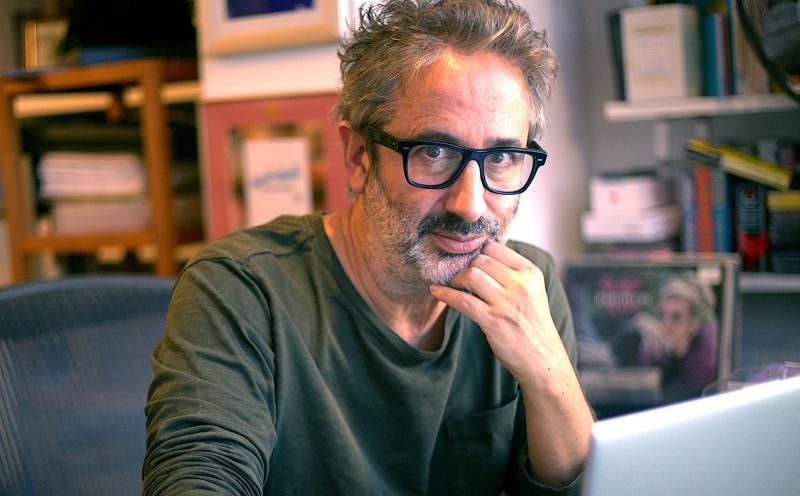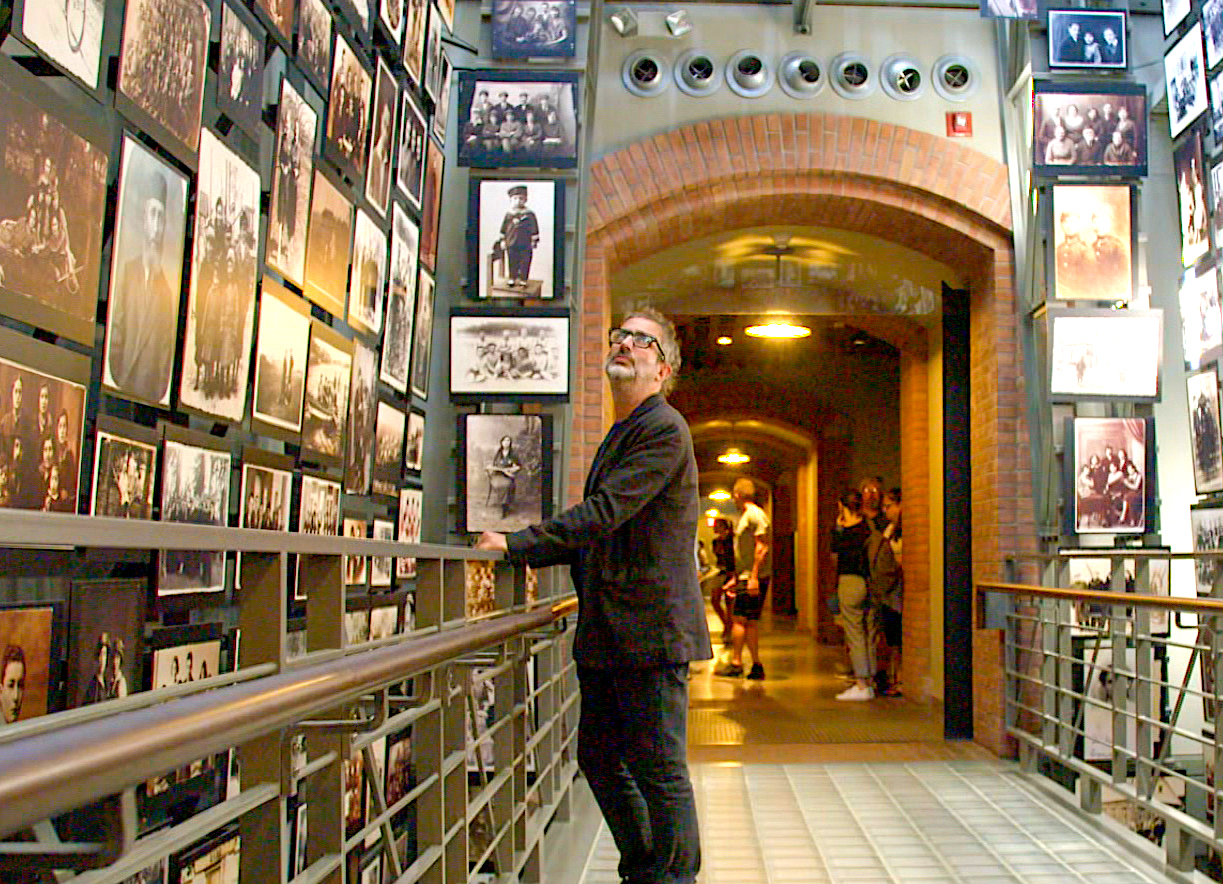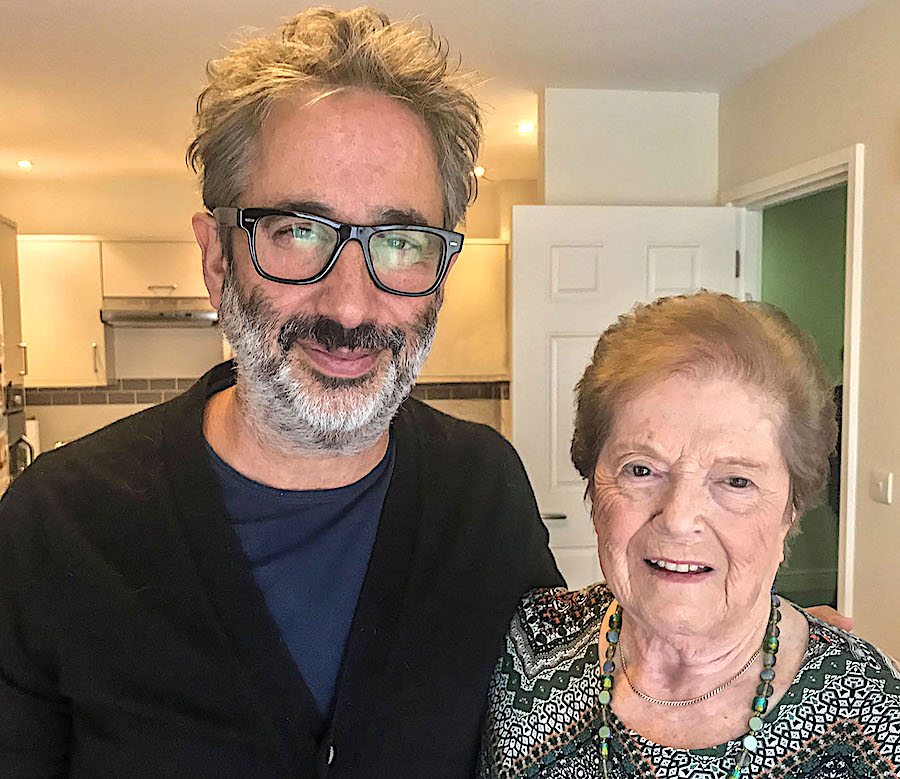Confronting Holocaust Denial with David Baddiel, BBC Two review - grappling with the incomprehensible | reviews, news & interviews
Confronting Holocaust Denial with David Baddiel, BBC Two review - grappling with the incomprehensible
Confronting Holocaust Denial with David Baddiel, BBC Two review - grappling with the incomprehensible
Writer and comedian tries to fathom how so many can deny such well-documented history

It’s all in the timing. Here was David Baddiel beginning a stand-up turn at a gig in Finchley. A Holocaust survivor gets to heaven, and God asks for a Holocaust joke. God says that his joke isn't funny, and the survivor replies “Well, I guess you had to be there.” Baddiel believes there is nothing that is impervious to a joke.
Thus his shocking introduction to his fascinating tour exploring the phenomenon of those who deny the Holocaust ever happened (for BBC Two). It was unabashedly and appealingly personal. His grandparents escaped to Britain from Germany just before the war and to them David owes his life. He showed us his grandmother’s German passport marked with a big red J for Jew. There was a photograph of the huge extended family that did not get out: all murdered.
The timing was fine-tuned: 2020 is 75 years since the end of World War Two, and the liberation of the camps. We are now surrounded by fake news, rising racial tensions everywhere, and increasing incidents of anti-Semitism (and currently in Germany, the trial of a nonagenarian concentration camp guard, 17 when he was conscripted). Baddiel himself, living in Twitterland, is the recipient of many a digital message; he showed us a sample from someone called Markus, a denier, who told Baddiel the Holocaust did not happen – but should have (pictured below, Baddiel at the Holocaust Memorial Musem, Washington DC). Statistics pop up: one in six people around the world believe the Holocaust never happened. In the Nordic countries, two per cent do not think the Holocaust took place, in Britain it is six per cent and in the Middle East, including Gaza and the West Bank (pace Israel), 82 per cent. There has been, Baddiel reminded us, a view long held by anti-Semites that paradoxically Jews were subhuman, but also somehow in control of the world. With the Final Solution, Himmler evidently noted that pages of glory were to be written. Perhaps surprisingly, Holocaust denial started in Auschwitz, where 600,000 were killed. The various camps were covered up, the ashes buried in the surrounding forests and rivers, and survivors sent on the notorious death marches.
Statistics pop up: one in six people around the world believe the Holocaust never happened. In the Nordic countries, two per cent do not think the Holocaust took place, in Britain it is six per cent and in the Middle East, including Gaza and the West Bank (pace Israel), 82 per cent. There has been, Baddiel reminded us, a view long held by anti-Semites that paradoxically Jews were subhuman, but also somehow in control of the world. With the Final Solution, Himmler evidently noted that pages of glory were to be written. Perhaps surprisingly, Holocaust denial started in Auschwitz, where 600,000 were killed. The various camps were covered up, the ashes buried in the surrounding forests and rivers, and survivors sent on the notorious death marches.
Over in Washington DC to visit the Holocaust museum (the nearest equivalent in England are the Holocaust galleries in the Imperial War Museum), Baddiel was surprised and touched by the quote from General, then President, Eisenhower carved into the exterior wall as you enter. When Ike visited the camps after the war, he declared he had to see it with his own eyes because in the future the realities of the Holocaust might be denied.
Terrifyingly, Baddiel’s investigations in the National Archives in Kew showed that the Ministry of Information covered up horror stories from the camps, known quite early in the war, as they should not be used to influence British minds, nor was the fate of Jews to be emphasised. Jews were not in the category of the indisputably innocent. And we were reminded that when the camps were liberated in 1945, accounts omitted the fact that the vast majority of the victims were Jews. War trials were wound down when West Germany was needed in the fight against international communism (pictured below, Baddiel with Holocaust survivor Rachel).
 And every mention of the Holocaust evidently brought the backlash of denial. The 1970s saw revisionist writers producing scientific “evidence” that no traces of cyanide existed in the walls of supposed gas chambers, and therefore there were no gas chambers. Pamphlets were published with titles such as Did Six Million Really Die?
And every mention of the Holocaust evidently brought the backlash of denial. The 1970s saw revisionist writers producing scientific “evidence” that no traces of cyanide existed in the walls of supposed gas chambers, and therefore there were no gas chambers. Pamphlets were published with titles such as Did Six Million Really Die?
Where did this noisy false history come from? In 1960 in Jerusalem Adolf Eichmann was the subject of the first worldwide televised trial. A huge amount of publicity followed. In 1978 an American mini-series following a fictional Jewish family was watched by 120 million people and a backlash of denial followed.
In 1993 the American academic Deborah Lipstadt’s book Denying the Holocaust attacked the publications of the British writer David Irving, perhaps the most prominent denier in the anglophone world; he had claimed Hitler had no knowledge of the extermination of Jews and that the gas chambers did not exist, and moreover that he could not deny the existence of the Holocaust as the Holocaust had not happened. In 1996 Irving brought a case for libel against Lipstadt, which garnered huge publicity; he lost and went bankrupt, but has continued to be a prominent denier. And currently in Lithuania Baddiel revealed that the reputation of a great wartime hero is under scrutiny for complicity in signing documents to condemn Jews.
Perhaps the most chilling moment came when Baddiel interviewed the head of public relations for Facebook in Europe, who, gently squirming, rejected Baddiel’s assertions that Facebook postings denying the Holocaust had anti-Semitic elements. Baddiel’s point about such denials today is that 20 years ago it might have been possible to ignore such profound distortions of history, but that social media now makes this impossible. He pointed out codes: “rootless cosmopolitans” was Stalin’s phrase for Jews, and was back in currency today to suggest an international Jewish conspiracy.
Baddiel’s telling envoi was his remark that if something is unbelievable the truth will always be attacked, and that was why memorials were needed. Our intrepid, curious and surprisingly calm narrator reacted to his findings with a potent mix of shock and astonishment. Why does such a plethora of denial exist? Where did and does this false history come from? Can it simply be an incurable toxic mix of politics and antisemitism? Baddiel’s chilling investigations were painfully topical, raising far more questions than they could answer.
The future of Arts Journalism
You can stop theartsdesk.com closing!
We urgently need financing to survive. Our fundraising drive has thus far raised £49,000 but we need to reach £100,000 or we will be forced to close. Please contribute here: https://gofund.me/c3f6033d
And if you can forward this information to anyone who might assist, we’d be grateful.

Subscribe to theartsdesk.com
Thank you for continuing to read our work on theartsdesk.com. For unlimited access to every article in its entirety, including our archive of more than 15,000 pieces, we're asking for £5 per month or £40 per year. We feel it's a very good deal, and hope you do too.
To take a subscription now simply click here.
And if you're looking for that extra gift for a friend or family member, why not treat them to a theartsdesk.com gift subscription?
more TV
 Too Much, Netflix - a romcom that's oversexed, and over here
Lena Dunham's new series presents an England it's often hard to recognise
Too Much, Netflix - a romcom that's oversexed, and over here
Lena Dunham's new series presents an England it's often hard to recognise
 Insomnia, Channel 5 review - a chronicle of deaths foretold
Sarah Pinborough's psychological thriller is cluttered but compelling
Insomnia, Channel 5 review - a chronicle of deaths foretold
Sarah Pinborough's psychological thriller is cluttered but compelling
 Live Aid at 40: When Rock'n'Roll Took on the World, BBC Two review - how Bob Geldof led pop's battle against Ethiopian famine
When wackily-dressed pop stars banded together to give a little help to the helpless
Live Aid at 40: When Rock'n'Roll Took on the World, BBC Two review - how Bob Geldof led pop's battle against Ethiopian famine
When wackily-dressed pop stars banded together to give a little help to the helpless
 Hill, Sky Documentaries review - how Damon Hill battled his demons
Alex Holmes's film is both documentary and psychological portrait
Hill, Sky Documentaries review - how Damon Hill battled his demons
Alex Holmes's film is both documentary and psychological portrait
 Outrageous, U&Drama review - skilfully-executed depiction of the notorious Mitford sisters
A crack cast, clever script and smart direction serve this story well
Outrageous, U&Drama review - skilfully-executed depiction of the notorious Mitford sisters
A crack cast, clever script and smart direction serve this story well
 Prost, BBC 4 review - life and times of the driver they called 'The Professor'
Alain Prost liked being world champion so much he did it four times
Prost, BBC 4 review - life and times of the driver they called 'The Professor'
Alain Prost liked being world champion so much he did it four times
 The Buccaneers, Apple TV+, Season 2 review - American adventuresses run riot in Cornwall
Second helping of frothy Edith Wharton adaptation
The Buccaneers, Apple TV+, Season 2 review - American adventuresses run riot in Cornwall
Second helping of frothy Edith Wharton adaptation
 The Gold, Series 2, BBC One review - back on the trail of the Brink's-Mat bandits
Following the money to the Isle of Man, Spain and the Caribbean
The Gold, Series 2, BBC One review - back on the trail of the Brink's-Mat bandits
Following the money to the Isle of Man, Spain and the Caribbean
 Dept. Q, Netflix review - Danish crime thriller finds a new home in Edinburgh
Matthew Goode stars as antisocial detective Carl Morck
Dept. Q, Netflix review - Danish crime thriller finds a new home in Edinburgh
Matthew Goode stars as antisocial detective Carl Morck
 The Rise and Fall of Michelle Mone, BBC Two - boom and bust in the lingerie trade
Life in the fast lane with David Cameron's entrepreneurship tsar
The Rise and Fall of Michelle Mone, BBC Two - boom and bust in the lingerie trade
Life in the fast lane with David Cameron's entrepreneurship tsar
 Code of Silence, ITVX review - inventively presented reality of deaf people's experience
Rose Ayling-Ellis maps out her muffled world in a so-so heist caper
Code of Silence, ITVX review - inventively presented reality of deaf people's experience
Rose Ayling-Ellis maps out her muffled world in a so-so heist caper
 The Bombing of Pan Am 103, BBC One review - new dramatisation of the horrific Lockerbie terror attack
Six-part series focuses on the families and friends of the victims
The Bombing of Pan Am 103, BBC One review - new dramatisation of the horrific Lockerbie terror attack
Six-part series focuses on the families and friends of the victims

Add comment